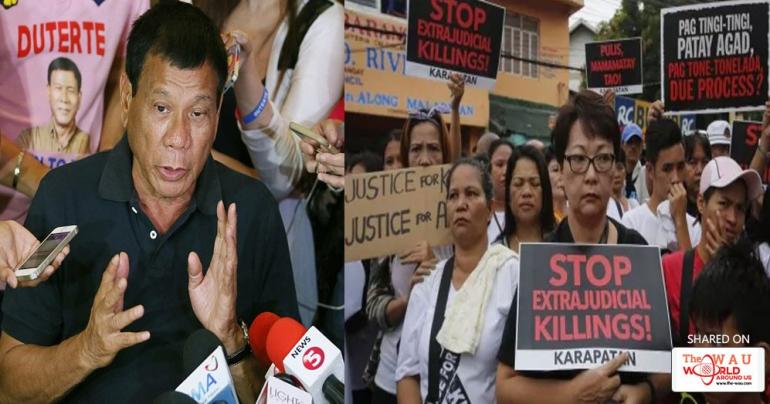Catholic leaders in the Philippines haven’t stopped duterte’s bloody war on drugs — yet. this is why
Philippine President Rodrigo Duterte’s bloody “War on Drugs” shows little sign of easing. In August, plainclothes police shot and killed 17-year-old student Kian delos Santos, days after killing 32 suspects in the single bloodiest day of the anti-drug campaign. Roughly 3,500 alleged dealers and users have been killed in official police operations since Duterte took office, with thousands more dead in vigilante killings.
After witness accounts and security camera footage revealed Kian to be unarmed, domestic and international protests forced government investigations. Duterte has pledged justice for Kian’s parents. But the president’s allies in the House of Representatives recently proposed a draft budget that would nearly eliminate funding for the constitutionally mandated Commission on Human Rights.
[Duterte has put part of the Philippines under martial law. Here’s how dangerous that can be.]
Catholic Church leaders are among those voicing outrage at the killings. Cardinal Luis Antonio Tagle, head of the Archdiocese of Manila, issued a letter expressing “pain and horror” at the killings, and the Catholic Bishops Conference of the Philippines (CBCP) is launching a campaign to memorialize victims of extrajudicial killings — commonly referred to as “EJKs.”
Tensions between Duterte and many Catholic leaders run deep. A look at recent research sheds light on the disputes, and helps explain why Catholics haven’t stopped the war, yet.
Catholic leaders are sharply criticizing Duterte’s campaign
Tagle, generally cautious in public pronouncements, declared in a Sept. 8 letter, “We cannot govern the nation by killing” and called for followers to “intensify our solidarity with those who have been killed.” On Sept. 12, the CBCP as a group put this more bluntly: “In the name of God, stop the killings!”
These letters have been paired with calls for organized action from clergy and laity. Bishop Pablo Virgilio S. David, incoming CBCP vice president, has given sanctuary to a witness and family members in Kian’s case. Tagle and CBCP leaders have called for a 40-day period of mourning, marked by daily ringing of church bells. The mourning will stretch through Nov. 1, All Saints’ Day, a major holiday commemorating the dead in the Philippines.
But Catholic leaders’ tensions with Duterte go much deeper
While the vivid details of Kian’s case provided an opportunity for Tagle and others to speak out, there are deeper sources of Catholic tension with the Duterte administration.
First, as many scholars have noted, the Catholic Church in the Philippines casts itself as a protector of the legacy of the “People Power Revolution” of 1986, a relatively bloodless overthrow of then-dictator Ferdinand Marcos. Some among the CBCP leadership clearly view Duterte as a threat to post-authoritarian institutions. Duterte has called for revisions to the 1987 Constitution, which religious elites significantly influenced, and has allowed Marcos to be buried in the nation’s Heroes’ Cemetery.
Second, Duterte has limited accomplishments in areas where some Catholic optimists thought they could make common cause with the president. Despite Catholicism’s relatively hierarchical structure, the CBCP is “multivocal.” Some Catholic elites hoped that Duterte’s proposed agenda could advance church interests on such subjects as peace negotiations with leftist and Moro insurgents, environmental policy, social welfare and land reform.
But a year into Duterte’s administration, peace negotiations have stalled. Duterte has declared martial law across the region of Mindanao to allow his military to combat terrorist cells. Duterte’s cabinet nominees dealing with the environment, land reform and social welfare have been blocked by the Commission on Appointments, a highly unusual occurrence given Duterte’s influence over the commission’s members, which has slowed policy progress related to those portfolios. Those within the CBCP who at first advised patience may be having a harder time making that case.
...[ Continue to next page ]
tag: blog , information
Share This Post






